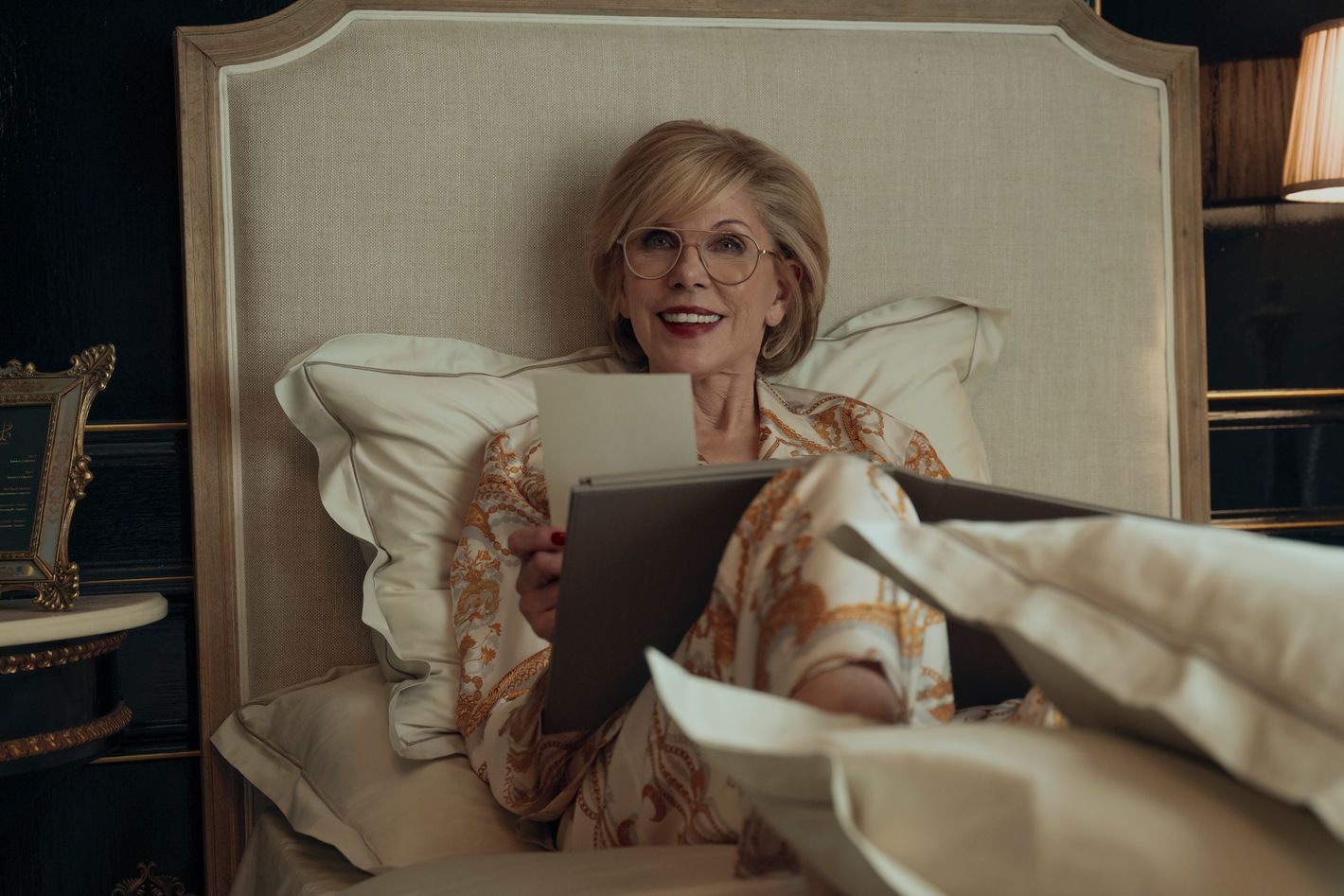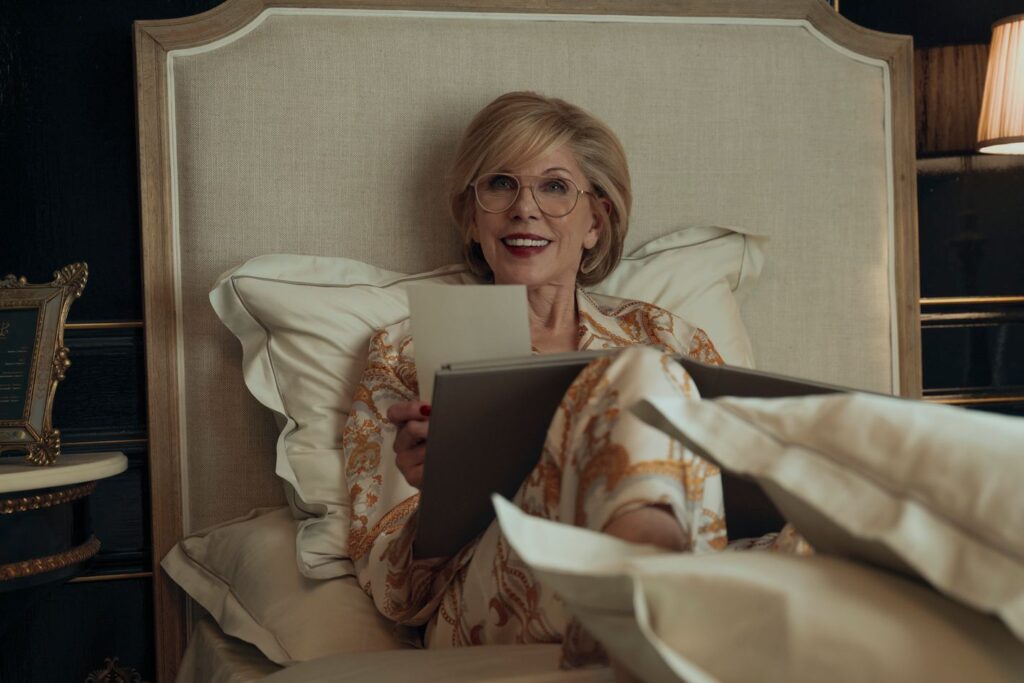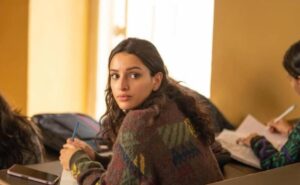
When we last saw Masha Dmitrichenko (played sharply by Nicole Kidman), she had gotten away with a lot. In her recap, Roxana Hadadi pointed out that Nine Perfect Strangers’s first-season finale provided a less-than-satisfying ending: Despite suggesting for eight episodes that something very bad, or at least very creepy, was going to happen, everyone who was at Tranquillum House, Masha’s wellness retreat–cum–psychedelic experiment, got exactly what they wanted and needed out of the experience — Masha herself most of all.
The first season closed by redeeming Masha’s self-serving motivations, and now, as we open on the second season, the main question is whether, and how, those motivations have changed in the months since she has been able to communicate with her late daughter, Tatiana. Is Masha transformed, like she promised people at Tranquillum they would be? Could the psilocybin treatment that allowed her (and the Marconis) to reconnect with Tatiana have spun out of control so that now she is haunted, rather than visited, by her daughter? Can the legacy and history of Zauberwald, the remote Bavarian clinic where Masha takes her practice, interfere with her “unorthodox methods”?
Right away, we see that Masha’s transformation has advanced in at least one obvious way: She has become something of an Elizabeth Holmes figure. We catch up with her at Bloomberg’s “disruptors conference,” where she is announcing the arrival of a “psychedelic delivery system” built with the help of her “friends in Silicon Valley” that will allow patients to revisit specific formative memories as if for the first time, which already sounds kind of confusing. Is the idea that revisiting something as traumatic as, say, the death of your son, as if for the first time, would help people heal? Like many of her peers in the “disruption” industry, Masha is being investigated by the federal authorities, but by this point in the narrative, it hardly matters: We have never known Masha to not be vaguely threatened by the law, though we’ve yet to see it create any real obstacle for her.
At the conference, Masha is approached by a man named Martin (Lucas Englander), who represents Zauberwald, a German clinic where Masha herself first came into contact with psychedelic therapy. He has come to offer her a residency of sorts; at Zauberwald, she would be able to continue developing and pushing her protocol — or, as Martin calls it, her “art” — away from the snooping of the American press or federal authorities. It’s a clever move to send Masha to Germany, where regulations are more relaxed, but the cultural focus on discipline creates tension between the spiritual and metaphysical aspects of Masha’s work and the scientific, clinical rigor behind them.
Martin steps up as the right side of Masha’s brain, a bastion of discipline who we can tell, from their first interaction, is going to either be forced or compelled to transgress his own boundaries and even perhaps let himself be seduced by Masha, like Yao and Delilah at Tranquillum. “No imperfect dosage, no dosage without consent, and no dosing yourself” are Martin’s no-fun rules. In Nine Perfect Strangers, tension emerges from the slightly antagonistic forces that both revere and challenge Masha’s notions. Along with Martin, we get opposition in the voice of Helena (Lena Olin), the heiress-proprietor of Zauberwald, whose grandfather built the clinic and — it’s implied — is the doctor who changed Masha’s life with psychedelic therapy. Helena seems at once taken with and disturbed by what Masha’s “unorthodox methods” might do to her grandfather’s legacy, but Masha insists that if only he would’ve been more open-minded, Zauberwald might not be tipping toward bankruptcy.
The first season of Nine Perfect Strangers came out in the summer of 2021, only shortly after The White Lotus premiered. The timing was fitting: Strangers is like a fun-house-mirror reflection of The White Lotus. Like that show, it places a motley crew of characters in an isolated, luxury refuge where people go to reconnect with themselves and one another. This season, the overlap deepens with the starring presence of Murray Bartlett, who gave us the indelible Armond and now plays Brian Tumkin, a frazzled, bearded, bearlike man who has a rough time, right out of the gate, with his luggage. It gets caught coming up and down the trolley, and when he finally gets a hold of it, he notices that one crucial piece is missing. He approaches a tiny woman in uniform (Dolly de Leon) who effortlessly takes care of all his luggage and promises to see about the missing one. Later, we’ll find out she is not a Zauberwald employee but a famous nun, Sister Agnes, who recently broke with the church but still inspires bowing from people. I do love the notion of a famous nun, especially in the aftermath of a real-life conclave and a movie one, so Sister Agnes is already topping my ranking of guests.
As for the rest of them: The first one we meet is Peter Sharpe (Henry Golding), who blows his cover as an alpinist not two minutes into his introduction to some camping Germans by getting picked up in a fancy Mercedes. Peter is under the impression that Zauberwald is just a fancy hotel, but one of the Germans warns him that it used to be a sanatorium where a relative died. Disturbing! Then we have Imogen O’Clair (Annie Murphy), who has arrived looking to reconnect with her mother, Victoria O’Clair (an already fun Christine Baranski), a return guest. Much to her daughter’s chagrin, Victoria has brought along Matteo (Aras Aydin), a new young boyfriend to whom Imogen is seriously mean. Imogen doesn’t seem to like Victoria very much, so the draw for her might’ve been the opportunity to experience Masha’s treatment for free after reading Lars’s buzzy New Yorker profile. Imogen comes in speaking about Jungian archetypes and ontology, claiming she’s “so over all the New Age wellness stuff.” Martin advises her to forget everything she thinks she knows, but as we’ll see, that’ll be difficult — she has a serious attitude problem.
Lastly, we have Wolfie (Maisie Richardson-Sellers) and her girlfriend, Tina (played by the musician King Princess), who are out of touch with each other, if happy to be on vacation. As in the first season, we have a few disparate categories of guests: those who are looking to reconnect with family (the Sharpes and the O’Clairs), those who are looking to reconnect with a partner (Tina and Wolfie), and those who are looking to reconnect with themselves (Brian and Sister Agnes). Unlike at Tranquillum, their phones don’t have to be confiscated because there is no service, something that Imogen and Peter discover at the same time. Later, at the bar, Imogen uses their run-in to slip him a pretty smooth line: “Did your date arrive?” It turns out he’s waiting for his dad, whose delay is unusual since he “hasn’t flown commercial since the ’70s.” The fact that Peter and Imogen are both in conflict with their parents sets them up neatly as a pair.
The guests all meet one another at the bar. Victoria and Matteo arrive and are instantly mocked by Imogen as she introduces them to Peter. Wolfie is there with Tina, who nicely but tellingly rejected Wolfie’s sexual advances in their room, where she winced at the sight of a piano. Brian asks Sister Agnes after his missing bag, still under the impression that she works there, which she does absolutely nothing to dispel. Martin is there, and finally Masha arrives, wearing a Traitors hood and a bitchy attitude. She greets Sister Agnes right away (this is how Brian finds out her true identity) and asks Peter about his father, whom he still hasn’t heard from. Sounding like an aloof hostess at a trendy downtown restaurant, Masha announces they can’t start protocol until everyone is there. People start freaking out.
At Tranquillum House, Masha dosed her guests with psilocybin without their consent, which then compelled them to decide whether they wanted to stay under her care or leave. The outcome was that, between Lars’s profile and Frances’s novel, Masha became a psychedelic-wellness celebrity of sorts. Bizarrely, many of the guests at Zauberwald seem not to know what she is all about. Tina, who didn’t read any of the articles Wolfie sent her, thought she was at a spa. “It is a cleansing of the mind,” Masha explains, and Imogen retorts, “I don’t feel safe with these vagaries.” Kind of a weird thing for her to say since the first thing she said to Peter when he joined her at the bar was that she thought it prudent not to drink “in case we start protocol tonight” and she seems to be caught up on Masha’s mysterious methods.
Martin tries to talk people down. Brian wonders whether it’s too late to get a refund. Tina thinks Wolfie brought her to a “cult” so that she’ll go back to playing the piano. In the meantime, Helena is angry that Masha brought in David Sharpe, Peter’s dad. All we know about him for now is that he is someone from Masha’s past. “There are plenty of billionaires who are not David Sharpe,” Helena counters when Masha suggests he could be a potential investor. Their back-and-forth, while revealing, is there for purely expositional purposes: As always, Masha has already done the thing that she was technically not supposed to do. David Sharpe (Mark Strong) is on his way, though he is in no rush — the episode closes with him still in London, instructing his staff to hold off on going to Zauberwald until “the deal is done.” His driver warns that they’ll run into weather if they wait until the next day. “Don’t I control the weather?” David poses. I hate him already.
The guests retreat to their rooms. Looking to escape her mother and Matteo and to maybe do some other stuff, Imogen moves in with Peter; Brian continues to freak out over his missing bag; having the bed, Sister Agnes opts to sleep on the floor; Wolfie plays the piano; and Tina cries while taking (another?) bath. Masha’s visions of Tatiana keep her awake, suggesting more haunting than healing. “I can’t sleep. I never sleep,” Tatiana whispers creepily.
Und So Weiter
• It’s hilarious that Masha’s first order of business upon arriving in Germany is cutting her hair into a disturbingly straight shoulder-length bob. Also, are there drugs in that tea she keeps sipping?
• Pretty good line delivery from Henry Golding when he goes, “Elfriede. That’s a beautiful name.”
• The Dutch angles are a bit too much for me. I get it — we’re dealing with psychedelics!
• Victoria remembers she met Sister Agnes in Rome once with “Elton,” meaning Elton John, though that couldn’t have been it since the occasion was a benefit for the Catholic Church. I’m excited to get many more great deliveries from Christine Baranski this season.
• Something has got to be up with Sister Agnes’s uniform situation. She tells Wolfie that when she got there, her clothes were “too dirty,” so the staff lent her their uniforms. How dirty could those clothes have been? Did she bring only one change of clothes? Or was it that she arrived fresh from the convent and didn’t have something to wear that wasn’t a habit? I’m reading some sort of omen paired with her regret when she tells Wolfie she wouldn’t want to be like her. There is some triteness around this setup, but I’m watching our famous nun closely.
Masha and her “unorthodox methods” have arrived in Germany, and so has her new group of guinea pigs.

































































